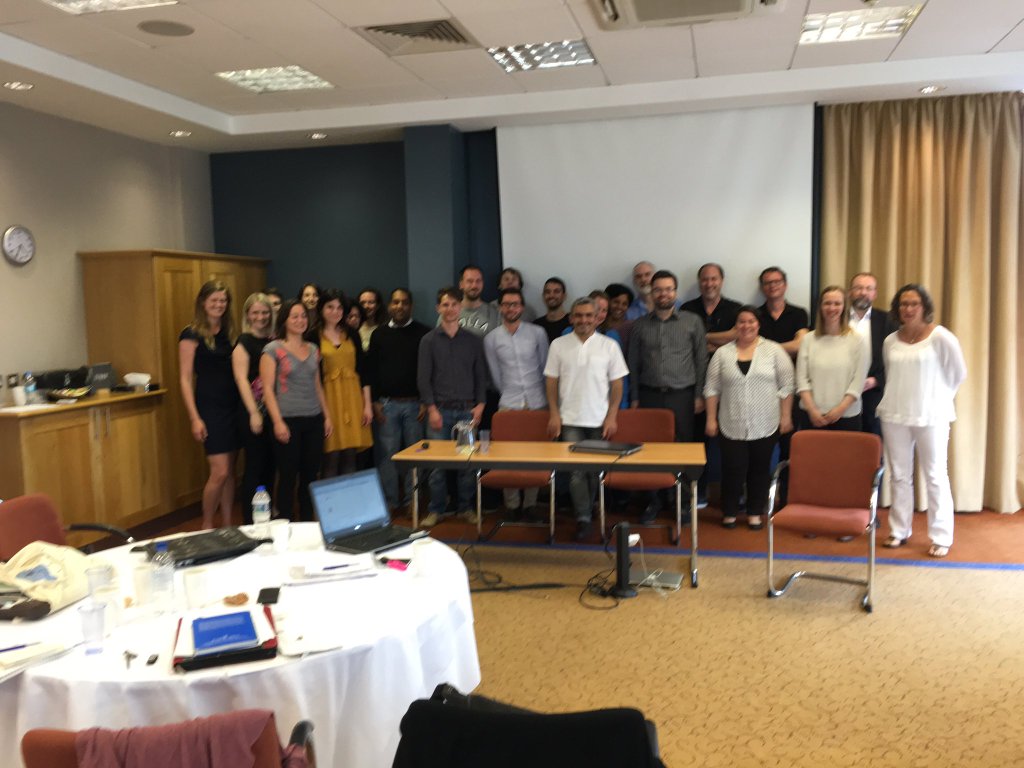Report on EASP Small Group Meeting: New Directions in the Social Psychology of Solidarity
28.05.2016, by Sibylle Classen in meeting report
May 10th-11th, 2016 in Brighton, UK; Organisers: John Drury, Roberto González, Nick Hopkins, Clifford Stevenson, and Hanna Zagefka

The Small Group Meeting ‘New directions in the social psychology of solidarity’ was organized by John Drury (University of Sussex, UK), Roberto González (Pontificia Universidad Católica de Chile and Center for Social Conflict and Cohesion Studies, Chile), Nick Hopkins (University of Dundee, UK), Clifford Stevenson (Anglia Ruskin University, UK), and Hanna Zagefka (Royal Holloway University of London, UK) in Brighton, UK, from May 10th to 11th 2016. The aim of this meeting was to discuss and analyse the different usages of ‘solidarity’ in research in contemporary social psychology and by doing so achieve some conceptual clarification and research agenda-setting. Implicitly or explicitly, ‘solidarity’ is a major theme in much contemporary research in social psychology. Yet, despite being so important in analyses of a range of social psychological phenomena, the concept of solidarity itself has received remarkably little sustained theoretical examination. Therefore in this meeting we sought to take this central but hitherto unexamined explanatory concept and to subject it to sustained critical examination.
We had 33 submissions before the deadline (and one or two after the deadline). Not counting the organizers, of the 19 people who had papers accepted (17 papers: for two papers there were two speakers), eleven were EASP members; seven were postgraduates, and a further four were junior lecturers, while two were full professors. The speakers were based in universities in the following countries: Turkey, Germany (2), Netherlands (4), Australia (2), UK (6), Belgium (2), Switzerland (1), and Norway (1). Eight of the speakers were men, the rest were women. Therefore, the meeting was a diverse group comprising people from different regions and stages in their careers.
The topics, angles and methodologies described in the papers were also diverse, including field questionnaire surveys, interviews, experiments, ethnography. We organized the presentations into themes, but many of the issues cut across these – including support from more privileged groups to less privileged, the relation between groupness and solidarity, the role of oughtness, the causes (vs consequences) of solidarity. Several papers across the themes were concerned with collective action and intergroup relations (or both).
On day 1, we began with a discussion of the nature of the concept of solidarity, taking us straight into debates about the relationship to helping and whether solidarity is a feeling or a set of behaviours or both. Research evidence was presented to show that measures of solidarity predict support behaviours over and above the effects of empathy. Other related concepts were examined empirically and conceptually including trust and prosociality, and various predictors were tested including moral outrage and moral elevation. Some of the groups and settings researched in the papers presented in the papers on Day 1 ranged from the local population in Sudan and campaign groups supporting refugees in Europe. Two papers showed how feelings of groupness – mechanical and organic solidarity - can be induced in those exposed to different structured forms of dance or conversation. The first day ended with papers on collective action in Gezi Park (Turkey), Romania and India.
On Day 2, we began by hearing about different studies that had examined solidarity in different types of collective action events and at the relation between those who do and those who don’t protest. Then there were papers on the possibilities and pitfalls of high status groups involving themselves in low status groups’ struggles for equality. The final presentations concerned friend networks as bases for solidarity and the place of solidarity in the ‘social cure’. Also on Day 2 we had a discussion about European sources of funding and strategies of taking the ideas discussed forward, including developing a network.
One of the features of the meeting that we put into the planning of the event, and which people seemed to appreciate, was the time set aside for discussion. Each presentation was followed by a full ten minutes for questions and discussion; and each day there were two further discussion opportunities following the discussants’ summaries. These discussion opportunities were always filled; one delegate commented that he has never seen so many questions and comments at an event like this, which indicates the level of engagement.
While there was agreement on a number of issues, there was no overall consensus in the meeting about what should be the focus of research on solidarity, and it is probably the case that some of the work is carried out anyway under different banners. Yet this was expected, and the open discussion of the relevant issues is the basis for the conceptual ground-clearing that we felt is important for progress in methods and theory. In practical terms, however, there was enthusiasm across the meeting for a journal special issue on the topic of solidarity, and we have had several email exchange since to continue discussing possible ideas for this.
List of participants:
Acar, Yasemin
Barth, Markus
Broekman, Aafke van Mourik
Cakal, Huseyin
Cruwys, Tegan
Drury, John (Organizer)
Easterbrook, Matt
González, Roberto( Organizer)
Hopkins, Nick Organizer
Iyer, Aarti
James, Trevor
Kende, Judit
Koudenburg, Namkje
Kutlaca, Maja
Moss, Sigrun Marie
Ntontis, Evangelos (Assistant)
Phalet, Karen
Politi, Emanuele
Postmes, Tom
Rees, Jonas
Sagherian-Dickey, Thia
Stevenson, Clifford (Organizer)
Subasic, Emina
Van de Vyver, Julie
Zagefka, Hanna (Organizer)